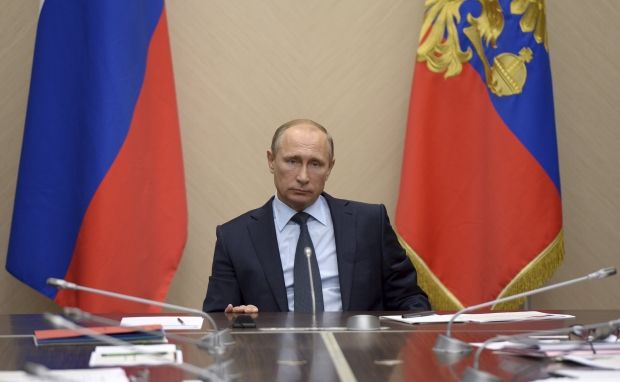
Fight for your right: Demanding compensation from aggressor state
This week marks the deadline for Moscow’s explanations regarding two complaints about the actions of the Russian Federation in Crimea and Donbas filed by Ukraine in the European Court of Human Rights (ECHR). Meanwhile, the inter-state lawsuits in the ECHR are being gradually supplemented by civil suits.
Over one and a half years since the beginning of Russian aggression on Ukrainian territory, Ukraine has filed several lawsuits in the ECHR, gradually renewing the materials for these complaints and adding up new evidence. According to the court’s regulations, Russia had to submit explanations regarding the first two Ukrainian claims before March 25 of this year. However, the Russian Federation asked for a six-month prolongation, which expires on September 25.
Meanwhile, Ukraine continues to collect evidence of Russian aggression in its territory. In this case equally important can be individual claims or class suites from the Ukrainian citizens who suffered from the actions of the aggressor state. The Ministry of Justice of Ukraine has been offering to file such suits since this summer the citizens from Crimea and Donbas, who were deprived of their Homeland and their property, to submit such claims to the ECHR.
However, individual claims (from individuals and legal entities) and inter-state lawsuits drafted by the State of Ukraine should be clearly separated. That is, the potential applicant may sue either independently or submit the form with their own story, as an addition to the future interstate lawsuit.
According to a Government Commissioner for the ECHR Borys Babin, there is sense in both mentioned ways, as they give a chance to punish the aggressor and even receive at least partial compensation for damages. At the same time, the citizens don’t have to undergo mandatory domestic court procedures, necessary in other cases of interaction with the ECHR, as it would be inefficient to appeal against actions of the occupation authorities in the Ukrainian courts, while the courts simply do not exist in the self-styled breakaway DPR and LPR, and they shouldn’t rely on any success of such initiatives in Russian-annexed Crimea. "In fact, you won’t be able to find justice in any national jurisdiction, and the European Court understands this," said Borys Babin.
Procedural aspects
Filing individual lawsuits in the ECHR is a fairly simple procedure, requiring no specific legal experience, according to Babin. "The [11-page] form of appeal to the European Court can be found on the website of the Ministry of Justice or on the website of the European Court; it is in PDF format and can be completed in Russian, Ukrainian or English; then you need to send a registered letter to Strasbourg. All evidence a person intends to submit to the Court should be in the form of photocopies," said Babin.
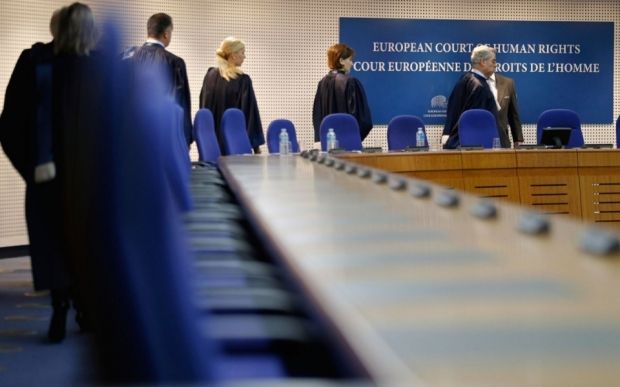
There is no need to present documented evidence of destruction of property. According to Borys Babin, any property that is located in the occupied territory is subject to compensation anyway. That is, even if the property is actually intact, citizens have the right to claim damages. "It is necessary to prove that you had this property (both for individuals and legal entities), and you can’t use this property... You don’t have to prove that something has been destroyed. The fact that it is located in the occupied territories, while you are in the territory of Ukraine and you are a registered internally-displaced person is a sufficient argument that your rights have been limited," said Babin.
However, if there is any evidence of seizure or destruction of the citizens’ property, it can be added to the lawsuit.
Babin still advises to get legal advice, reminding that the Minister of Justice instructed to provide such advice in the Ministry’s regional centers for free legal assistance.
At the same time, there is a procedure of filing anonymous claims for those fearing that they, or their relatives who have remained in the occupied territories, may be persecuted. These claims will become part of the inter-state action drafted by the State of Ukraine. However, it should be noted that, in contrast to the individual suit, such claims will be considered by the ECHR for a much longer period. "While an individual suit is considered for two to four years, the interstate complaints filed back in 1970s have not yet been resolved by the court," said Babin, adding that the reason for this is the fact that such claims cover a large set of facts.
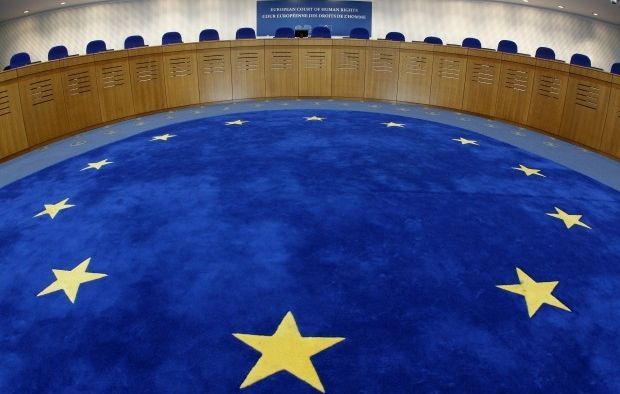
In addition, it should be noted that the compensation for interstate lawsuit will be available only after it will receive state and, in particular mechanism, it will distribute among the affected.
However, the lawyers warn that neither a method of submitting an interstate complaint to the ECHR, nor its content, will not be known to those citizens who decided to complete it with their individual suits, including with the anonymous claims. "That is, the submission of a complaint by a State deprives a person of the ability to control the process. Subsequently, it may be so that the applicant's story was not included in the complaint, for whatever reasons, whereas submission of an individual claim provides such control," said Serhiy Zayets, legal expert at the Regional Center for Human Rights.
Problems of evidence
Lawyers say that filing of an individual claim in the ECHR is not as simple as the officials say. "This very promising claim may be spoiled due to ignoring elementary formal requirements," said Serhiy Zayets.
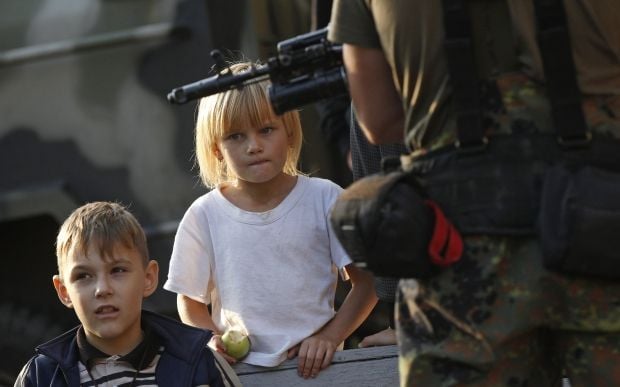
In addition, the IDPs from Crimea and Donbas may face a particular problem. For example, when some fear possible repercussions if re-entering Crimea, while Russia does not significantly obstruct reentry to the peninsula, then there is no violation, formally, according to the lawyer.
However, in his opinion, not so many former residents of Crimea are now ready to file suits in the ECHR, for various reasons. "If we are talking about nationalization of property, it often concerns certain businesses, and the people [the owners] have something else, except nationalized property, that they are afraid to be deprived of," he explained.
There is also an arguable issue of what professionals call "exhaustion of effective means." Roughly speaking, we are talking about the need to appeal against the decisions or actions of Russia in Crimea in the courts, which exist in Crimea, itself. "Unfortunately, we have a sad precedent when the Demopoulos vs Turkey case, the ECHR found unacceptable a high number of cases due to the fact that the applicants did not appeal against the violation of their rights in the courts, which operated in the occupied part of Cyprus," said the expert.
However, lawyers admit that there may be exceptions from such a scheme in the Ukrainian situation. But the Crimeans, themselves, prefer to either be safe, or not to risk.
At the same time, IDPs from the occupied areas of Donetsk and Luhansk regions are in an even more confusing situation, according to human rights lawyer Stanislav Batrin, which is significantly complicated by the status of the conflict. Namely, by the fact that there is an Anti-terrorist operation, but not the military action against the aggressor state, in particular - Russia. "When it comes to protecting the interests of Ukraine, we are talking exclusively about the aggressor state, which is Russia, and this is it. In a more broad sense, Ukraine must work on establishing the facts of Russian aggression, because just a political decision, adopted by the Ukrainian Parliament, is not enough either for Ukraine, or for the world," said the expert.
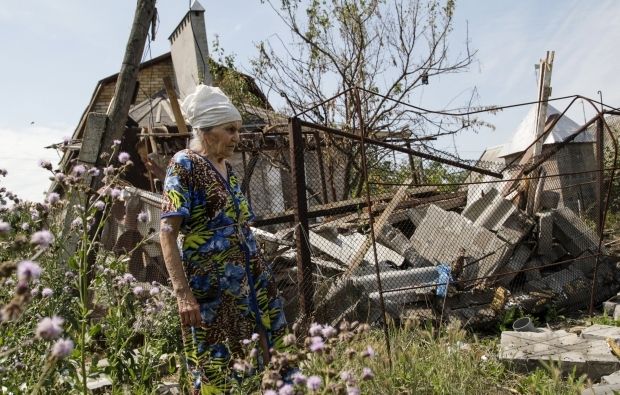
According to him, in this sense, Ukraine has a big problem, as "for over a year, there have been no court decisions in Ukraine, which would have established guilt of Russian military in the events in the east." Moreover, the regular references to the so-called "DPR" and "LPR" in the international arena do not allow the international community determining the unequivocal fact that there is "only one combatant, which has been inflicting damage upon the citizens of Ukraine, which is Russia." "In such a situation we should not the possibility that the Court will fail to find Russia guilty in [causing] the events in Donbas. It may only limit its ruling to the general theses about human rights violations by armed groups in the east of the country," he stressed.
However, the Government Commissioner for the ECHR Borys Babin says that the definition of what is happening in eastern Ukraine as an Anti-terrorist operation in no way interferes with the Ukrainians suing Russia. "The ATO applies to both occupied and unoccupied territories. And a totally different thing is the is the regime of the occupied territories, recognized as such by the Verkhovna Rada and approved in accordance with the Minsk Agreements. These agreements established a demarcation line between government-controlled territories and the areas beyond government control. In accordance with the international law, the occupation authorities bear all responsibility for violations occurring in uncontrolled [occupied] territories. We have a number of documents recognizing that that this territory is in fact occupied. The European Court has already recognized this, itself," he said.
A blind eye of the State?
According to the volunteers from the Kharkiv Station NGO, which provides all kinds of assistance to the IDPs, citizens do have a desire to sue, but their efforts must be forwarded in the right direction. "Quite often, we have people coming and asking for help in drafting lawsuits, wishing to receive some at least compensation for their destroyed property in the ATO zone. We provide free legal assistance and advice, help them draft claims. A person can apply to any local police station in an area where they reside, in order to register the fact that their property has been destroyed. Some use satellite imagery, , but there is a problem of proving that these images are not fake. Some IDPs turn to the state authorities on the government-controlled territories, as close as possible to the occupied areas, such as Artemivsk, hoping they can at least get some evidence that their houses have been destroyed," say the activists.
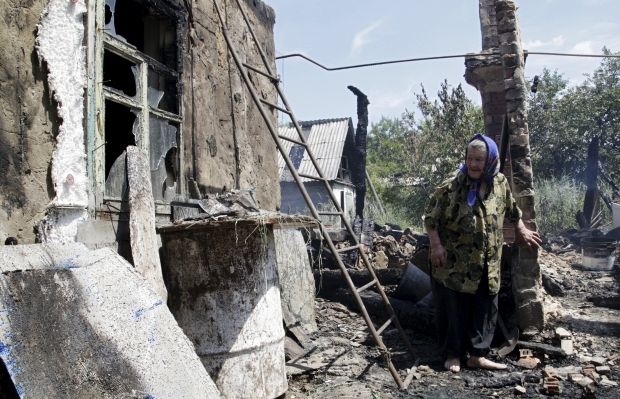
But, in general, they recognize that the problem is a “blind spot” for both the volunteers and the IDPs. So, the assistance of the State is needed for the collection of high-quality evidence.
This opinion is shared by the human rights activist Stanislav Batrin. According to him, such assistance should be provided by an Office of the Ombudsman for protection of the interests of the State against military aggression by the Russian Federation. Such Office should be specially created at the Cabinet level, which should, among other things, "monitor the damages of the state, its citizens, and subjects of private law at a daily basis."
According to Batrin, if the government does not actively participate in the process of filing individual lawsuits, Ukraine may also receive claims against itself. "Individuals can file lawsuits against Russia, but there needs to be a single position of the State, which should be reflected in thousands of such claims. For each claim there should be presented the same factual and legal basis, not substantiated with references to the media, but with the specific documents issued by public authorities that fix various violations of rights of the Ukrainian citizens. If not, chaos will ensue, and it is possible that there will not only be lawsuits against Russia, but also against Ukraine. Left alone with their problems, the citizens, influenced by the Russian propaganda, may as well sincerely believe that this is Ukraine that is destroying their lives. This is a very important question, which Ukraine is not working through on a top level," said the human rights activist.
The government commissioner for the ECHR Borys Babin acknowledges that there actually are such claims against Ukraine: "We have about 500 claims in the European Court, with the majority of them - against the two states [Russia and Ukraine]."
He says, several legal or human rights organizations assist in drafting such claims, so the citizens must responsibly choose their “aidees.”
...The process of restoring justice through the ECHR is rather long and difficult. But the Ukrainians should choose, whether to surrender, or to sue.
Tatiana Urbanskaya, Yelena Pashchenko

